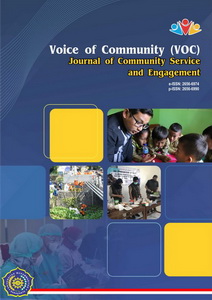Digital Financial Literacy Training for Student Koperasi: Creating a Financially Intelligent Young Generation
DOI:
https://doi.org/10.23917/voc.v5i2.11068Keywords:
Digital Finance Literacy, Student Koperasi, Training, Student , community serviceAbstract
Understanding and skills in digital-based financial literacy are essential, this requires the younger generation, especially students, to have these skills. However, based on the National Survey of Financial Literacy and Inclusion in 2022, it showed a low financial literacy index among the 18-25 age group of 39.94%, therefore targeted educational interventions are needed. Community service activities were carried out to improve the digital financial literacy of the management of the Semarang University Student Koperasi (KOPMA) through training and mentoring. The implementation method consists of four stages, namely socialization and pre-test, interactive training, technical assistance, and evaluation and post-test. The results of the activity showed a significant increase in participant understanding, with the average post-test score increasing from 48 to 82. In addition, 92% of participants stated that they were ready to implement a digital financial recording system in management of koperasi. This activity succeeded in equipping participants with skills in using the Google Sheet and BukuKas applications for recording transactions, preparing financial reports, and cooperative cash planning. This program has an impact that effective digital financial literacy training can strengthen the governance of student cooperatives and form a young generation that is financially intelligent and adaptive to technological developments.
Downloads
References
Azmi, Z., Anriva, D. H., Rodiah, S., Ramashar, W., Ahyaruddin, M., Marlina, E., Bidin, I., Putri, A., Lawita, N. F., Akuntansi, P., & Ekonomi, F. (2018). Peningkatan Literasi Keuangan Melalui. 2(1), 66–73.
Julito, K. A., Tambun, S., & Putra, R. R. (2023). Edukasi Tata Kelola Keuangan Pribadi Melalui Pemanfaatan Fintech Pada Siswa Smks Assa Adatul Abadiyah Bekasi. 3(1), 7–13.
Kusdiana, Y., & Safrizal, S. (2022). Faktor-Faktor Yang Mempengaruhi. 6(1), 127–139.
Kusumastuti, D., Prof, U. I. N., Zuhri, K. H. S., & Indonesia, P. (2021). Peningkatan Literasi Keuangan melalui Pelatihan Evaluasi dan Perencanaan Keuangan Sehat Berbasis Syariah pada Pengusaha Muslim Skala Mikro Kecil di Purwokerto. 1(1), 31–42.
Kusumawati, E. D., Putra, A. S. B., Kartikasari, D., & Triputra, U. P. (2023). Literasi Keuangan sebagai Variabel Moderasi dalam Pengaruh Persepsi Keuangan Terhadap Perencanaan Keuangan. 22(2), 247–260. https://doi.org/10.32639/fokbis.v22i2.738
Otoritas Jasa Keuangan. (2021). Strategi Nasional Literasi Keuangan Indonesia 2021-2025. Otorisasi Jasa Keuangan.
Otoritas Jasa Keuangan (OJK). (2022). Survei Nasional Literasi dan Inklusi Keuangan 2022. Jakarta: OJK
Sari, M. P., & Irdhayanti, E. (2022). Pengaruh pengetahuan perencanaan keuangan dan sikap keuangan terhadap perencanaan keuangan pada mahasiswa. JURNAL ECONOMINA, 1(3), 439–451. https://doi.org/10.55681/economina.v1i3.100
Utami, E. M., & Puspitasari, D. M. (2022). Peningkatan Kemampuan Perencanaan Keuangan Generasi Z Melalui Literasi Keuangan Dan Pengalaman Keuangan.
Vivi Armadhani, & Hwihanus Hwihanus. (2024). Analisis Literasi Masyarakat Tentang Pengelolaan Keuangan Pribadi Terhadap Tabungan, Investasi, dan Pengeluaran. GEMILANG: Jurnal Manajemen Dan Akuntansi, 4(2), 33–47. https://doi.org/10.56910/gemilang.v4i2.1173
Wardhani, A. C., & Iramani, R. (2019). Jurnal Ilmu Manajemen dan pendapatan. 11, 473–481.
Downloads
Submitted
Accepted
Published
How to Cite
Issue
Section
License
Copyright (c) 2025 M Adhitya Wardhana adhit, Nur Hayati Haya

This work is licensed under a Creative Commons Attribution 4.0 International License.








